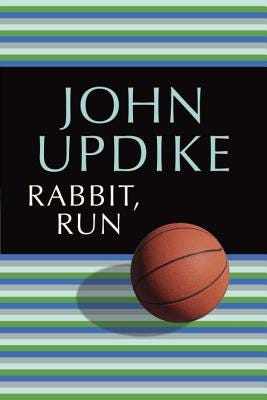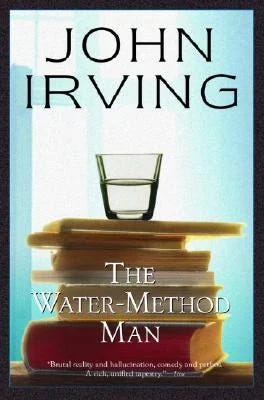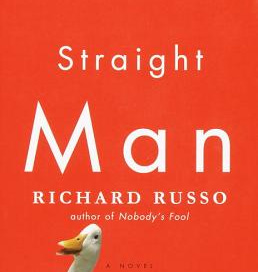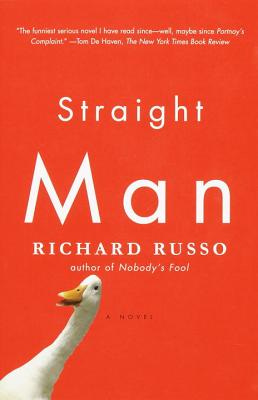I’m going to have to start re-reading the books I select for my Biblioracle Book Club held at The Village Bookseller in Mount Pleasant, SC before, rather than after I select them because when I re-read the most recent selection, I did not care for the book nearly as much as I thought I did.
The book is Straight Man by Richard Russo - who remains one of my personal most dependable authors when it comes to delivering a satisfying reading experience - but also, I did not particularly enjoy reading Straight Man this time around.
I want to spend a little time unravelling why, what this says about how we change as people (and readers) over time, as well as how the world changes around us.
Not a lot of people know this, but I am the world’s leading expert in a particular genre of book, the WMFUN.
WMFUN stands for White Male F-Up Novel1, and it’s possible that the reason I’m the leading expert is because I coined the category almost a dozen ago in an essay for the Book Riot website, which now appears to have been lost to the internet ether.
Straight Man is a WMFUN, centered on Henry Devereaux Jr. (Hank), an English professor and interim chair of a dysfunctional department at an invented regional public university which seems like a proxy for one of the Penn State branch campuses.
Henry is just shy of 50, with two grown daughters, still married to the beautiful and accomplished wife (Lily) who for most of the novel is away for an extended weekend to interview in Philadelphia for a possible job as a school principal. In the early chapters, we learn that the beautiful, accomplished Lily simultaneously loves and is exasperated by Hank, while also being the check on his worst instincts that tip his natural irreverence into carelessness. As Lily leaves, everyone is concerned about what state Hank will be in by the time she returns.
The novel must move Lily out of the scene so Hank can begin to fuck-up, which he does, repeatedly, as he negotiates the intrigue around a looming university-wide budget cut, manages a fractious department which may recall him as chair, and tries to help his troubled daughter Julie, who is building a replica of Hank and Lily’s house with her husband Russell, now using some of Hank and Lily’s money in the process.
The novel opens with Hank having been “gigged” by the jagged edge of a wire from a spiral bound notebook by one of his colleagues (Gracie), and things get worse for Hank from there. When he holds up one of the campus geese by the neck on a live local news show and threatens to kill a waterfowl a day until he receives a budget for his English department, things become even more complicated.
It is a satire, relying on exaggeration for comic and narrative effect, though it remains quite grounded, skirting the satirical/real line for much of the book.
The book is told entirely through Hank’s first person narration, so even though it’s clear that we’re not meant to see all of Hank’s acts as admirable (even by his own admission), he is the hero of the story, which requires us to sympathize with and root for him as he negotiates his travails if we’re going to enjoy the reading experience.
One of the hallmarks of the WMFUN is a character, who because of his identity and position/status shouldn’t really have a problem in the world, but for some reason, they just find themselves unmoored, needing to find a way back to the secure, stable, good life we understand should be something of a given.
The WMFUN character is often carrying some kind of trauma, which does the unmooring. In Hank’s case it is a troubled relationship with his father, a world-famous academic who we’re told pioneered a particular branch of literary studies and ran out on Hank and his mother, spending his life with a series of his students. Henry Sr. looms in the narrative, both spiritually and literally as he is scheduled to arrive in Henry’s town to move back in with Henry’s mother following an apparent breakdown.
In one of my other favorite WMFUNs, Richard Ford’s The Sportswriter, the main character, Frank Bascombe is adrift following the sudden death of his young son, which destroyed his marriage. There is a sub-genre of addiction WMFUNs, including Fredrick Exley’s A Fan’s Notes, and Jesus’ Son by Denis Johnson.
Though, truth be told, often a contributing, if not central, factor in the effing up by they WM is simple, old-fashioned horniness. These fellows often have an overwhelming urge to get laid by someone who is not their spouse. John Irving’s The Water Method Man is perhaps my favorite all-time WMFUN. See also John Updike’s Rabbit novels as another example.



Often, the WMFUN is really just a vehicle by which to explore that which ails society, as an unsettled WM suggests a state of disorder in the universe as a whole. This is in fact how Ford, with Frank Bascombe, and Updike, with Rabbit Angstrom, utilize their protagonists, turning them into portals for thoughts about how the world works, or should work, or (often) used to work better.
We don’t need so many WMFUNs anymore now that we have Substack newsletters, where people like me can drop the scrim of fiction and just pour out all his WM thoughts and have them sent to a couple thousand inboxes.
If it’s not clear, some of my favorite novels are WMFUNs, because as a WM it is interesting and enjoyable to spend time inside a narrative that seems written to your particular concerns. Early on in graduate school, I was so enamored of The Sportswriter, I tried to write a WMFUN very much in its image about a Chicago area television producer for a Jenny Jones (remember her) type talk show who is estranged from his wife and in pursuit of a set of Siamese twins as guests on the show.
(You can’t see it, but I am facepalming myself at this moment.)
When I first read Straight Man, I was twenty-seven years old, fresh from my graduate school experience inside of academia, and the story of an almost-fifty-year-old English professor with a beautiful wife, who semi-discretely lusts after a bunch of other beautiful women (his secretary, the daughter of one of his colleagues, and the chair of Women’s and Gender Studies) while giving his self-righteous colleagues all kinds of (probably deserved) crap looked roughly like a fantasy, aside from the prostate troubles Hank tangles with through the duration fo the story.
I’m pretty certain that when I read Straight Man the first time, I rooted for Hank’s success, that even if I might not do the exact same things he did under the same circumstances, I understood and even approved of his actions.
Hank is funny. He is loved by a smart and beautiful woman and other smart and beautiful women seem to like and be interested in Hank, who is also such a good guy we know he would never cheat on Lily.
I’m sure I thought that Hank is a good man.
Hank is a good man, or at least he is not a bad man, but my response to Hank now that I am older than Hank, was markedly different than when I first read the book 25-years ago.
While Hank’s self-admitted flaws are a significant engine for the narrative, and we couldn’t really do without them story-wise, I spent a fair amount of time thinking that Hank needed to cut the crap and get his shit together. I could see why his colleagues were annoyed by him, and his nickname “Lucky Hank,” which is intended with a certain amount of irony as bad things befall him in the story, is ultimately accurate, as he manages to emerge from all his scrapes arguably better off than he was before.
Much of the satire of academia - sadly - holds up quite well. What ails non-elite institutions - lack of funding, a handful of malign administrators - seems to not have changed over the last twenty-five years.
But many of Hank’s attitudes seem somewhat retrograde, and the way we’re meant to appreciate the goodness of Hank feels like a bit of a cheat.
One of the techniques Russo relies on to make Hank likable is to see his goodness reflected in how the beautiful, admirable women in his life see him. There is Lily, who finds him exasperating, but also desirable and true. There is Rachel, his secretary who reveres and serves Hank. Hank has taken Rachel’s collection of short stories and sent it to his literary agent because he thinks they’re so good. There is also Meg, an instructor in the department, and daughter of one of his colleagues, who appears to be flirting with him by leaving peach pits on his desk blotter.
The women in Hank’s life are not just beautiful but smart, witty, capable of parrying any of Hank’s schtick. Hank is not a sexist. He is helping his secretary achieve publication, even though Hank has dried up as a novelist since his first and only published book twenty years earlier. Hank considers the possibility of leaving his job to follow Lily’s career and is good with it.
But it is important to recognize - as I do now, but did not before - that the novel is not rendering how these women see Hank, but how Hank believes these women see him.
It is an interesting technique, one that reminds me of the work of Aaron Sorkin in how he often treats women characters. The women of The West Wing are smart, capable, every bit as accomplished or more so than the male characters. President Bartlet’s wife is a world-renowned physician. C.J. Craig, the press secretary, is often shown to be correct in her stances even as the men sprint around being wrong. The president’s daughters are highly educated, capable women. His eldest daughter Elizabeth is married to a dimwit who runs for congress ultimately revealing her to be the power and brains behind the man.
But as smart and capable as all of these women are, the narrative often seems to signal that what is most important is the degree of approval the men have for these women. It is the male characters who validate the accomplishments of these women.
I think we call this the male gaze.
In Straight Man, because we are so close to Hank for the entire story, we do not get any insight into the independent lives of these women except as they relate to Hank. I began to wonder what these folks really thought of Hank, and found myself more interested in those questions than Hank’s march through his own self-created disasters.
Perhaps this is an inevitable response to reading a book you’ve read before, though mostly I think it’s a byproduct of having spent more than 50-years on the planet seeing the world through my male gaze, and bit-by-bit over time becoming a little more curious about perspectives that aren’t mine.
Let me be clear, I do not maintain that this makes me somehow superior to Hank, a fictional character, or anyone else for that matter. I am just as self-deluding as every other person on the planet. I’m not extending a moral judgment to Hank or Straight Man. That I had a different reaction to the book reading it twenty-five years later is a comment on me, not the book. I make no claims to virtue here.
Lots of people in the book club enjoyed it, and undoubtedly Russo captures some essential truths about the male psyche (for good and ill) in the novel. I still enjoyed much of it, just not quite as unreservedly or uncritically as I had in the past.
How we respond to specific narratives doesn’t need to be litigated as part of a broader culture war, with right and wrong answers, and factions taking sides. There are plenty of WMFUNs out there, with more being made all the time, and I still enjoy my share, but as I’ve aged, I’ve come to appreciate there’s a lot of other stories out there, and the stories by folks who see the world through a gaze different than mine have become more interesting to me.
When I was young and going through my Beats phase and read Jack Kerouac’s On The Road, (a two character WMFUN) like many a young man, I was attracted to freedom with which Sal Paradise and Dean Moriarty engage with the world, even though deep down, I knew that I did not have the same free spirit. But we’re meant to see these adventures as a kind of birthright, the chance to exercise one’s freedom is a kind of given.
But of course, not every character in the novel is quite so free as Sal and Dean, and the stories of those people may have more depth and drama than the story we’re told in On the Road.
For years, I’ve joked that it would make an interesting sequel to On the Road to write a book from the perspectives of the people Sal and Dean encounter along the way.
I’d title it, Who Were Those Assholes?
Links
This week at the Chicago Tribune, I give some holiday gift giving advice.
Also at the Tribune, Christopher Borrelli has provided the paper’s official list of Top 10 Books. My far less authoritative, but equally interesting list of Biblioracle Book Awards will appear in the paper over the next three weeks, starting next week.
If you’re looking for a guide to help you access Cormac McCarthy’s novels, David Ulin has provided the goods at the Los Angeles Times.
The New York Times has a book gift guide of their own. Also at the Times, their list of the 10 best books of the year.
Looking for a biography? Over at Esquire, Adam Morgan gives you his list of the 50 best of all-time to chew on.
Over at his Substack,
, Patrick Nathan looks at the ways bigotry threatens literature.Recommendations
All books linked here are part of The Biblioracle Recommends bookshop at Bookshop.org. Affiliate income for purchases through the bookshop goes to Open Books in Chicago.
Affiliate income is $319.60 for the year.
1. The Tsar of Love and Techno by Anthony Marra
2. Leave Society by Tao Lin
3. Wise Blood by Flannery O'Connor
4. Embrace Fearlessly the Burning World by Barry Lopez
5. A Different Drummer by William Melvin Kelley
Karen O. - Cambridge MA
This was a prize-winning book that’s gotten lots of attention so it’s possible that Karen has read it - if so, send me an email and I’ll give another one - but I have to go with my strong Biblioracle sense that the right next read for her is The Sympathizer by Viet Thanh Nguyen.
Like every week, I’ll remind readers that this is an entirely reader-supported enterprise and it is your subscriptions that make it possible. Thanks to all who share and subscribe.
See you all next week,
JW
The Biblioracle
I’m not going to spell out the whole f-word because my mom reads these things and it bothers her when I swear in print, but there may be a time or two where the euphemism doesn’t cut it, sorry Mom.






i loved this book! but i also read it 20+ years ago. maybe i should re-read and see if i still like it
"but as I’ve aged, I’ve come to appreciate there’s a lot of other stories out there, and the stories by folks who see the world through a gaze different than mine have become more interesting to me."
Mapping the infinite landscape of the human heart......
Thank you for a really thoughtful and thought-inspiring essay.
Earlier this year, I read -- Seating Arrangements by Maggie Shipstead.
https://www.penguinrandomhouse.com/books/210651/seating-arrangements-by-maggie-shipstead/
Curiously listed by the publisher as "Women's Fiction", it is a really enjoyable and thoughtful WMFUN (the overlap of WF and WMFUN may make for an interesting essay, too!). At the end of the first sentence, you suspect the already-disengaged white male is going to be tripping over himself throughout --
"By Sunday the wedding would be over, and for that Winn Van Meter was grateful."
-- and by the end of the first paragraph, you know you are guaranteed a train wreck. Somehow comforting in its cringeworthy hilarity.
Even his initials are WM, lol.